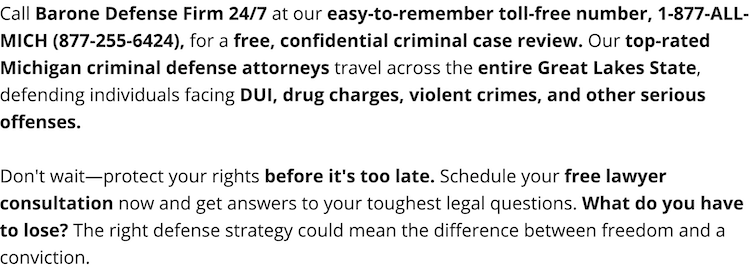Implied Consent License Suspension Dismissed – Livonia Hearing Victory
Implied Consent
Livonia Driver Assessment and Appeal Division
Client was charged with high BAC OWI and was separately charged with a violation of the implied consent law. If found responsible for the implied consent violation, client's license would be suspended for one year. The following is a description of the administrative law hearing relative to the alleged implied consent violation. The hearing took place in Livonia Michigan.
Client was driving through speed trap on University Road in Rochester Hills Michigan, in the general area east of the Hospital. This is a 25 mile per hour zone. Officer was sitting stationary and sees client drive by him. Report indicates client was traveling "faster than speed limit." Also, that when he caught up to her, she had no license plate lights and accelerated rapidly from a stoplight. Client was administered horizontal gaze nystagmus, alphabet, counting backwards, walk and turn and one leg stand. Officer testified that she failed all of them, was arrested, and then refused the test after her chemical test rights were read. After the officer completed his testimony, the driver assessment and appeal division (DAAD) Hearing Officer, based on his duty to help unrepresented parties, questioned the officer at length about his administration of the field sobriety tests. The DAAD Hearing Officer did not question the police officer about the chemical test rights. The case was then turned over to us for cross-examination and argument. Because the officer had failed to state from what form, if any, he read the chemical test rights, and because he also failed to further elucidate exactly what rights were read, we waived cross-examination, and argued that the officer had failed to meet his burden of proof relative to issue 3, (of four standard issues) which pertains to the reading of the chemical test rights. The Hearing Officer agreed with our argument, and dismissed the implied consent suspension. This victory meant that client's license would not be suspended for one year, and in fact, the client suffered no consequence whatsoever from refusing to submit to the breath test. It was as if it never happened.
 Barone Defense Firm Home
Barone Defense Firm Home
















